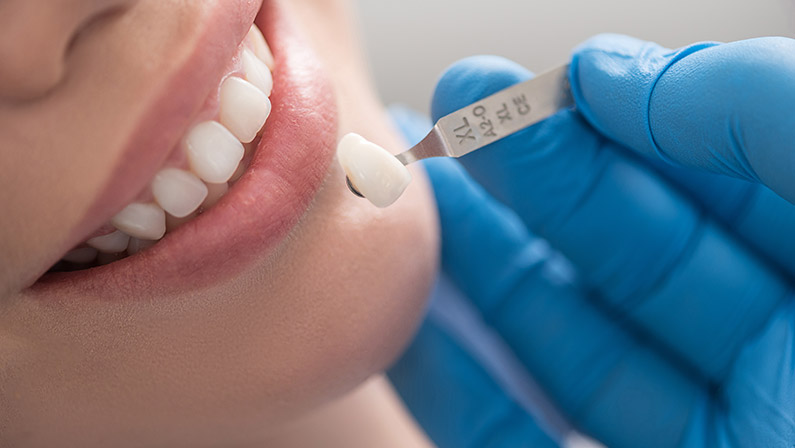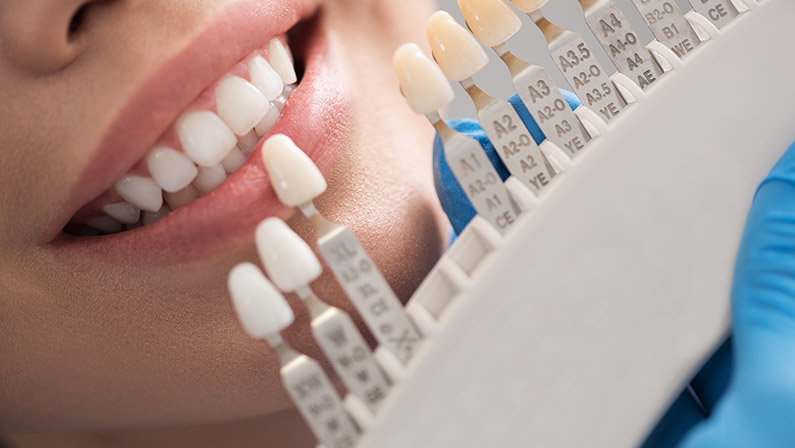Dental crowns play a crucial role in restoring smiles, addressing various dental concerns with a versatile and aesthetic solution. This comprehensive guide will delve into the intricacies of dental crowns, covering everything from the procedure and types to costs and maintenance.
What is a dental crown?

A dental crown, often referred to as a dental cap, is a tooth-shaped prosthetic that encases a damaged or decayed tooth, restoring its shape, size, strength, and appearance. It acts as a protective shell, enhancing both functionality and aesthetics.
Types of Dental Crowns
It’s essential to know the diverse options available. The type of crown you choose can significantly impact both the functionality and aesthetics of your smile. In this section, we’ll delve into various types of dental crowns, each with its unique characteristics and suitability for specific dental needs.
Porcelain-Veneered Zirconia
This type combines the strength of zirconia with the natural look of porcelain, providing durability and aesthetics.
IPS e.max (Lithium Disilicate)
Known for its strength and translucent appearance, this crown is an excellent choice for cosmetic enhancements.
Ceramic
Offering natural aesthetics, ceramic crowns are a popular choice for front teeth restorations.
Gold Alloy
Renowned for its durability, gold alloy crowns are often used on molars for their strength and longevity.
Base-Metal Alloy
A budget-friendly option, base-metal alloy crowns are corrosion-resistant and suitable for various teeth.
Porcelain-Fused-to-Metal (PFM)
This versatile option combines the strength of metal with the aesthetics of porcelain, making it a widely-used choice.
Composite Resin
A more affordable option, composite resin crowns provide a natural appearance but may be less durable than other materials.
Dental Crown Pros & Cons

Before delving into the intricacies of dental crown pros and cons, it’s crucial to understand the dual nature of this dental solution. Dental crown procedures offer a range of benefits but are not without their considerations. Let’s explore the advantages and potential drawbacks to help you make an informed decision about whether dental crowns are the right choice for you.
Pros
- Restoration of Tooth Functionality: Dental crowns serve as a robust solution for restoring the functionality of damaged or weakened teeth. Whether a tooth has undergone extensive decay or suffered trauma, a crown provides structural support, allowing you to bite and chew with confidence.
- Aesthetic Enhancement: Beyond functional restoration, dental crowns contribute to the aesthetic improvement of your smile. Crafted from various materials, including porcelain and ceramic, crowns mimic the natural appearance of teeth, ensuring a seamless blend with the rest of your dental arch.
- Protection of Weakened Teeth: Dental crowns act as protective shields, enveloping vulnerable teeth and shielding them from further damage. This preventative measure is particularly beneficial for teeth with large fillings, ensuring they remain secure and resilient.
- Long-lasting Solution: One of the significant advantages of dental crowns is their durability. When properly cared for, crowns can withstand the rigors of daily use, providing a long-lasting solution for tooth restoration. This durability makes them a cost-effective investment in your oral health.
Cons
- Possibility of Sensitivity: Following the placement of a dental crown, some individuals may experience temporary sensitivity. This sensitivity is typically mild and diminishes over time. Your dentist can advise on appropriate measures to alleviate any discomfort during this transitional period.
- Potential for Chipping or Cracking: While dental crowns are durable, there is a slight risk of chipping or cracking, particularly if subjected to excessive force or if you have certain habits like teeth grinding. Avoiding habits that put undue stress on the crowns can mitigate this risk.
- Requires Enamel Removal: To accommodate the crown, a portion of the tooth’s enamel must be removed during the preparation phase. While this is a standard part of the procedure, it’s essential to acknowledge that enamel removal is irreversible.
- Initial Cost Investment: While dental crowns offer long-term benefits, the initial cost may be a consideration for some individuals. It’s important to discuss with your dentist the various materials available and their associated costs to find a solution that aligns with both your oral health needs and budget.
Reasons To Use A Dental Crown

Understanding these varied reasons illustrates the versatility of dental crowns, showcasing their importance in both restorative and cosmetic dentistry. Whether addressing functional concerns or enhancing the aesthetics of a smile, dental crowns play a pivotal role in maintaining overall oral health and well-being.
Protecting a Weakened Tooth
Dental crowns provide a protective layer for teeth that have been weakened due to extensive decay, large fillings, or structural damage. The crown encases the tooth, preventing further deterioration and reinforcing its strength.
Restoring a Broken Tooth
When a tooth has suffered fractures or breaks, a dental crown becomes an essential solution for restoring its integrity. The crown covers the damaged area, restoring both form and function to the affected tooth.
Enhancing the Appearance of a Misshapen Tooth
Dental crowns are employed for cosmetic purposes, transforming the appearance of misshapen or irregularly sized teeth. By placing a crown over the tooth, a harmonious and aesthetically pleasing smile can be achieved.
Covering Dental Implants
Dental implants, while effective in replacing missing teeth, may require a crown to complete the restoration. Crowns are custom-designed to attach securely to dental implants, mimicking the look and function of a natural tooth.
Supporting Dental Bridges
Dental crowns play a crucial role in supporting dental bridges. By anchoring the bridge to adjacent healthy teeth with crowns, the prosthetic bridge fills gaps created by missing teeth, restoring a seamless dental arch.
Addressing Cosmetic Concerns
Beyond misshapen teeth, dental crowns are used to address various cosmetic concerns, such as severe discoloration or staining that cannot be remedied through traditional teeth whitening methods. Crowns provide a consistent and aesthetically pleasing tooth color.
Reinforcing a Tooth After Root Canal Treatment
Teeth that have undergone root canal therapy may become more brittle over time. Placing a dental crown over the treated tooth provides additional strength, protecting it from potential fractures and ensuring long-term functionality.
Preventing Tooth Fractures in High-Risk Cases
In individuals with a history of tooth fractures or those at a higher risk due to habits like teeth grinding, dental crowns act as a preventive measure. Crowns provide an added layer of protection, reducing the risk of fractures.
Correcting Bite Issues
Dental crowns can be used to address bite issues by adjusting the size and shape of specific teeth. This helps in achieving a more balanced and functional bite, reducing the strain on the jaw joint.
Long-Term Tooth Preservation
For teeth with extensive damage or decay that might otherwise require extraction, dental crowns offer a viable alternative. By preserving the natural tooth structure, crowns contribute to long-term oral health.
Dental Crown Procedure: What to Expect
The dental crown procedure is a meticulous process designed to restore a tooth’s function and aesthetics. Understanding the key steps involved can help individuals approach the treatment with confidence.
Tooth Examination and Preparation
The process begins with a thorough examination of the affected tooth. Your dentist assesses the extent of damage or decay and ensures that a dental crown is the most suitable solution. To prepare the tooth for the crown, the dentist will remove a portion of the enamel, creating a stable foundation for the crown to be placed.
Impression Taking
Once the tooth is prepared, an impression of the tooth and its surrounding area is taken. This step is crucial for creating a custom-fit crown that aligns seamlessly with your natural teeth. Traditionally, impressions were made using a putty-like material, but modern dentistry may employ digital scanning for a more precise and comfortable experience.
Temporary Crown Placement (if necessary)
In some cases, a temporary crown may be placed on the prepared tooth while the permanent crown is being fabricated. This temporary crown protects the tooth and maintains functionality until the final restoration is ready.
Crown Fabrication
The impression serves as a blueprint for the dental laboratory to craft the permanent crown. Depending on the chosen material (such as porcelain, ceramic, or a combination of materials), the fabrication process may take a few days to a couple of weeks. Advanced technology, like CAD/CAM systems, has expedited this phase, allowing for same-day crown placement in some cases.
Color Matching (for Aesthetic Crowns)
If the dental crown is intended for cosmetic purposes, efforts are made to match the color of the crown to the natural shade of your surrounding teeth. This ensures a seamless and natural appearance, especially for crowns placed on front teeth.
Final Placement
Once the permanent crown is ready, you return to the dentist for the final placement. The temporary crown, if used, is removed, and the new crown is carefully fitted and adjusted. The dentist evaluates the fit, bite, and aesthetics, making any necessary adjustments to ensure optimal comfort and functionality.
Cementing the Crown
With the final adjustments complete, the permanent crown is cemented onto the prepared tooth. This secure attachment ensures the crown remains in place during everyday activities like eating and speaking.
Post-Placement Instructions
After the crown is secured, your dentist will provide instructions on post-placement care. This may include recommendations for oral hygiene practices, dietary considerations, and any potential temporary adjustments to your routine.
Throughout the entire process, your dentist plays a pivotal role in guiding you through each stage, and addressing any concerns or questions you may have. Open communication ensures a comfortable and effective dental crown procedure, resulting in a restored smile that is both functional and aesthetically pleasing.
Side Effects of a Dental Crown Procedure
While dental crown procedures are generally safe, some potential side effects may include temporary tooth sensitivity, discomfort, or minor adjustments needed for bite alignment. These effects are typically short-lived and can be addressed by your dentist.
How can I maintain my crowns?
Maintaining dental crowns involves practicing good oral hygiene, avoiding excessive force on the crowns, and scheduling regular dental check-ups. Following your dentist’s recommendations for care will contribute to the longevity of your crowns.
How long does a dental crown last?
The lifespan of a cosmetic dental crown depends on various factors, including material, oral hygiene, and daily habits. On average, dental crowns can last anywhere from 5 to 15 years or more with proper care.
How much does a dental crown cost?
Dental crown costs vary depending on factors such as material, location, and complexity of the procedure. It’s essential to consult with your dentist to get an accurate estimate based on your specific needs.
When To See Your Cosmetic Dentist in Houston, TX For A Dental Crown Procedure
Knowing when to seek a cosmetic dentist’s expertise is crucial. Dr. Saif Shere, located at 9824 Fondren Rd, Houston, TX 77096, stands out for his exceptional cosmetic dental services. Whether you’re considering a dental crown for restorative or cosmetic reasons, Dr. Shere’s expertise ensures personalized and top-tier care.
Transformative Smiles Through Dental Crowns
The journey to dental excellence unfolds with the versatile solution of dental crowns, offering restored functionality, enhanced aesthetics, and enduring oral health benefits. From addressing structural issues to cosmetic imperfections, the reasons for choosing dental crowns are diverse and impactful. Understanding the types, procedures, and maintenance of dental crowns empowers individuals to make informed decisions about their oral health.
When seeking cosmetic dental crowns in Houston, TX, Dr. Saif Shere, DMD emerges as a trusted professional, providing tailored solutions for unlocking radiant smiles. Schedule a consultation today to embark on your journey to dental excellence.